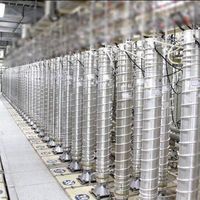The Russian leader praised Iran’s Supreme Leader for boosting relations according to a readout of the meeting carried by Russian state media, two days after the United States and European allies hit Iran with new sanctions for alleged transfer of missiles to Russia.
Putin credited Ali Khamenei for expanding relations between the countries and thanked new president Masoud Pezeshkian for committing to closer relations with Russia.
Iran and Russia have deepened their ties in the years since Moscow’s full-scale invasion of Ukraine in 2022, in which Russian forces have unleashed hundreds of Iranian drones on military and civilian targets.
Both countries are heavily sanctioned by the West and appear to be edging towards a “strategic partnership” pact mooted by Russian Foreign Minister Sergey Lavrov earlier this month.
Ahmadian was hosted on the sidelines of a meeting among top national security officials from BRICS countries ahead of the group’s 2024 summit in Kazan, Russia in October.
Pezeshkian is due to attend the summit and hold bilateral meetings with Putin in Moscow to sign the bilateral treaty, Iranianian media reports say.
Earlier this week, the US and the E3 (Britain, France, Germany) said they had evidence, which they did not immediately release publicly, that Iran had shipped missiles to Russia and sanctioned Iranian individuals and entities including state carrier Iran Air.
Iran and Russia have denied any missile shipments. Reports of an Iranian missile transfers are inaccurate, Kremlin's spokesperson Dimitry Peskov said on Wednesday.
Iran's foreign ministry on Thursday summoned the envoys of Britain, France, Germany and the Netherlands to protest the sanctions according to Mizan, the news agency of Iran’s judiciary.








